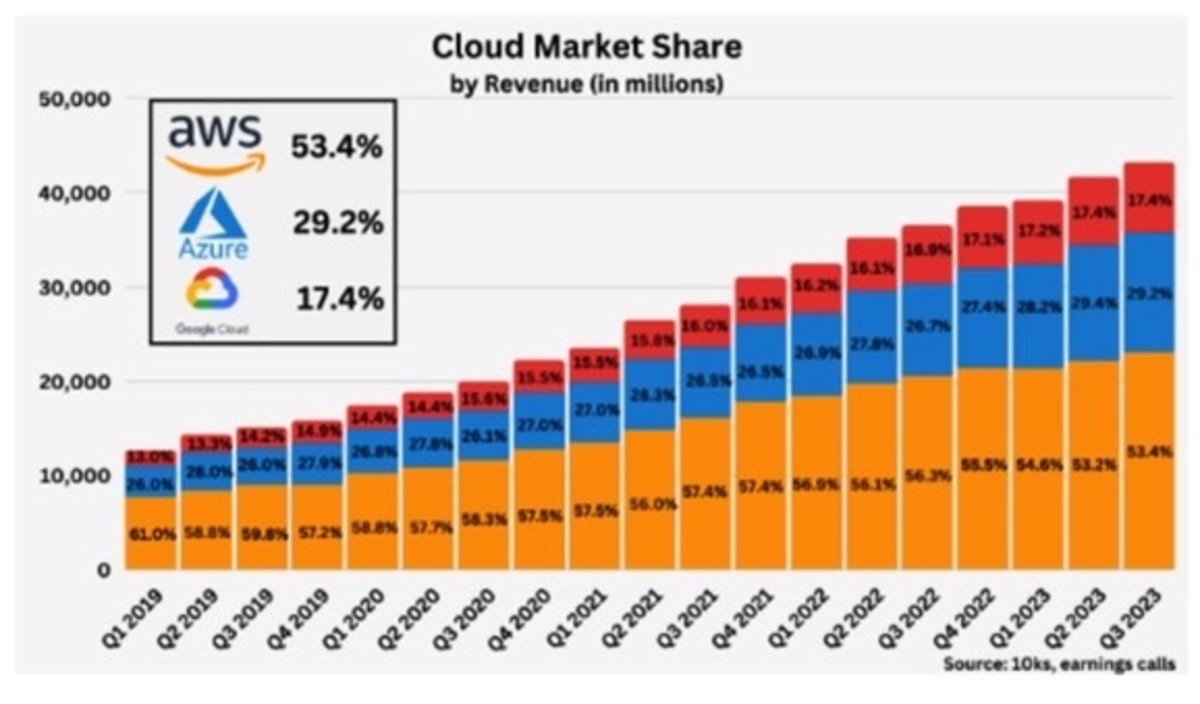As I stand in the bustling heart of Seattle’s tech district, the air is buzzing with excitement about artificial intelligence (AI) and its potential to reshape the business landscape. Amid this fervor, one name keeps surfacing in conversations with investors and industry insiders: Amazon. Despite not being the first company that comes to mind for AI, Amazon’s strategic position in the AI revolution through its cloud computing arm, Amazon Web Services (AWS), is turning heads on Wall Street.
On September 24, 2024, Amazon’s stock (NASDAQ: AMZN) closed at $191.16, reflecting a growing investor confidence in the company’s AI-driven future. But what’s driving this optimism? Let’s delve into why Amazon is emerging as a frontrunner in the AI investment race.
Amazon Web Services, often overshadowed by the company’s e-commerce operations, is quietly becoming a juggernaut in the AI space. As I tour AWS’s state-of-the-art data centers, the scale of Amazon’s cloud computing infrastructure becomes apparent.
Sarah Johnson, a senior cloud architect at AWS, explains, “What many people don’t realize is that AI, especially generative AI, requires massive computing power and data storage. AWS provides this infrastructure, making us an essential partner for companies looking to develop and deploy AI solutions.”
This synergy between cloud computing and AI is propelling AWS to new heights. In the second quarter of 2024, AWS revenue soared by 19% year-over-year, boasting an impressive operating profit margin of 36%.

The Double-Edged Sword of Cloud Migration and AI
As businesses continue their digital transformation journey, two key trends are converging to benefit AWS:
1. Ongoing migration of business workloads to the cloud
2. The surge in demand for AI-related computing resources
Mark Thompson, a tech analyst at a leading investment firm, notes, “We’re seeing a perfect storm for AWS. Companies are not only moving their existing operations to the cloud but also ramping up their AI initiatives, which require even more cloud resources.”
Amazon’s AI assistant, Amazon Q, is playing a crucial role in this transition. By simplifying the complex process of migrating to the cloud, Amazon Q is helping AWS capture a larger share of this growing market.
The potential for growth in the cloud computing sector is staggering. According to a recent report by Mordor Intelligence, the global cloud computing market is expected to expand from $680 billion in 2024 to a whopping $1.44 trillion by 2029.
As the current market leader in cloud services, AWS is well-positioned to capitalize on this growth. With its first-mover advantage and continuous innovation in AI services, AWS could potentially capture a significant portion of this trillion-dollar market,” says Emily Chen, a cloud industry expert.
While AWS contributes just under 20% of Amazon’s total revenue, its impact on the company’s profitability is far more significant. In fact, AWS accounts for a staggering 64% of Amazon’s operating profits.
John Davis, a financial analyst specializing in tech stocks, explains the implications: “The outsized contribution of AWS to Amazon’s profits means that any growth in this division, particularly driven by AI adoption, could have a substantial positive effect on Amazon’s overall financial performance.”
This profit potential hasn’t gone unnoticed by investors. Amazon’s forward price-to-earnings ratio of 40.2, as of September 26, 2024, reflects high expectations for future growth, largely pinned on the success of AWS in the AI era.
While AWS is the star of Amazon’s AI show, the company’s AI initiatives extend far beyond cloud services. As I walk through Amazon’s Seattle headquarters, I see AI at work in various aspects of the business.
Lisa Zhang, a product manager for Amazon’s e-commerce platform, showcases how AI is enhancing the online shopping experience: “From personalized product recommendations to AI-powered customer service chatbots, we’re using AI to make shopping on Amazon more intuitive and efficient than ever before.
In Amazon’s massive fulfillment centers, AI and robotics work in tandem to optimize logistics operations. “Our AI algorithms help us predict demand, optimize inventory placement, and even guide our robotic systems in picking and packing orders,” explains Robert Jones, head of Amazon’s AI in Logistics division.
As our tour of Amazon’s AI ecosystem comes to an end, the investment case for the company becomes clearer. Amazon’s deep integration of AI across its businesses, coupled with AWS’s dominant position in cloud computing, presents a compelling opportunity for investors looking to capitalize on the AI revolution.
However, it’s important to note that Amazon’s current valuation already prices in significant future growth. At 40.2 times forward earnings, the stock is by no means cheap. Yet, many analysts argue that the potential upside from AI-driven growth in AWS and increased efficiencies in Amazon’s commerce businesses justify the premium.
“When you consider the long-term potential of AWS in the expanding cloud and AI markets, combined with the efficiency gains AI could bring to Amazon’s other operations, the current valuation could prove to be a bargain in hindsight,” suggests Michael Lee, a veteran tech investor.
As we look to the future, it’s clear that Amazon’s bet on AI, particularly through AWS, positions the company as a key player in the ongoing technological revolution. While challenges and competition remain, Amazon’s diverse ecosystem and strong foothold in cloud computing make it a compelling choice for investors seeking exposure to the transformative potential of AI.
















Add Comment